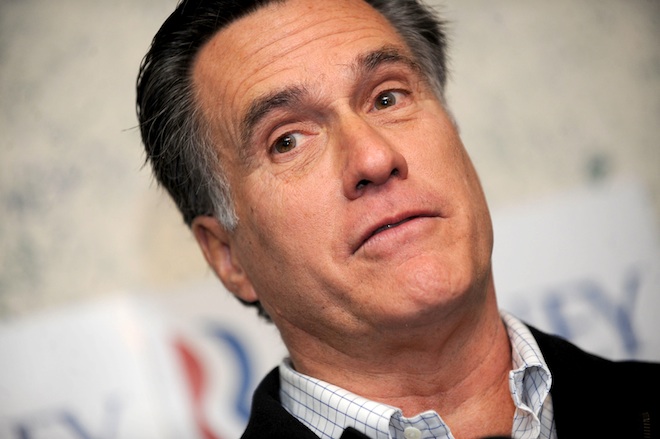The Iowa caucuses are in less than 24 hours and Mitt Romney is edging out a lead at exactly the right time, polling neck and neck with Ron Paul for first place in a state where even a top three finish might be enough to put him on a glide path toward the nomination. But you wouldn’t know it from the other campaigns’ latest attacks: Rick Perry is bashing Rick Santorum. Michele Bachmann is attacking Paul. Paul is bashing Newt Gingrich. And none of their ads go after Romney particularly hard.
The current free-for-all is only the latest lucky break for Romney, whose rivals have been unable to unite against the frontrunner since the earliest days of the campaign. And it’s a maddening source of frustration for his Republican and Democratic opponents alike, who complain he’s getting an easy ride to the nomination as a result.
For Obama’s supporters, the dynamic was a key factor in national Democrats’ decision to become involved in the primary, where they have devoted virtually all their resources to attacking Romney.
“Everyone has spent so much time and effort becoming the Romney alternative they have to date missed their best shot, which was to take him out,” one Democratic strategist told TPM. “He’s the most vulnerable candidate in the field on issues of his core and character as a politician and he’s all but gotten a free pass.”
Strategists on all sides identify Romney’s relative comfort as a product of the large number of competitive candidates more than any deliberate move on his part.
“When you have a crowded field like that, many of the voters who don’t have a fixed level of support for one candidate will tend to shop around,” Kevin Madden, a Republican strategist who worked on Romney’s 2008 campaign, told TPM. “So each of these campaigns has felt the need to post-up against one another.”
By contrast, Romney, “by virtue of having run before and by focusing his efforts on running against Obama, has built a solid following of supporters who have stuck with him through the process.”
Because Romney’s floor and ceiling were so rigid and his background so well established, campaigns with limited funds to get their message out always had more tempting targets.
“They realized these other candidates were weaker then Romney and easier to attack,” one strategist on a rival Republican campaign told TPM. “If you can pick up 6% here and 7% there, then you can beat Romney who is always steady at 20-25%.”
It seemed there always was some shiny new hopeful surging in the polls to knock down with before focusing on Romney. First it was Perry, whose brief stint in the frontrunner seat sparked tough attacks on his immigration record, his support for an HPV vaccine mandate in Texas, and, of course, his lousy debate skills. Then Herman Cain, whose surprise success led candidates to bash his signature 9-9-9 plan before his various alleged improprieties sunk his campaign. Then Gingrich, who candidates have slammed over everything from his “historian” work for Freddie Mac to his centrist lapses on climate change and health care. Finally, Santorum and Paul are under fire thanks to their late momentum.
And there always additional considerations to attacking the candidate most likely to win the nomination. Bachmann, for example, hesitated to attack Romney in the hope she might get a Vice Presidential nod, according to one ex-adviser.
Romney, for his part, has at least tried to encourage these divisions at times. He made it a point to praise or call attention to Cain and Bachmann in debates when they were down in the polls knowing he would benefit from a bump by either as a counterweight against his better funded and more dangerous rivals.
The strategy is reminiscent of Clint Eastwood’s trademark Mexican standoffs — if you’re in a gunfight with multiple opponents, the best thing you can do is convince them to shoot each other.









